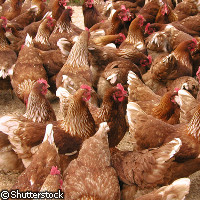Higher mortality seen in free-range hens during changeover from battery cages
Researchers in Sweden have demonstrated that chickens raised in 'litter-based' coop systems, including free-range chickens, are more susceptible to disease than their caged counterparts, especially immediately after the switch-over from a battery system. The findings, which are published in the journal Acta Veterinaria Scandinavica, came out of a 2001 to 2004 survey of 914 commercial laying hens and have implications for food safety. However, the researchers emphasise that good management practices are effective at improving the welfare of free-range chickens. Battery cages were initially adopted in the 1930s as an efficient and productive way to raise chickens: they made egg retrieval and waste removal easier and seemed to decrease parasitism. However, the cages do not provide the birds with enough space to do what chickens do naturally: stand, walk, flap about, perch and make nests. In response to public concerns for animal welfare, Sweden passed an act in 1988 mandating that laying hens be switched over from battery cages to more humane housing, including free-range and indoor 'litter-based' systems. The EU followed suit in 1999 with a Council Directive (1999/74/EC) phasing out battery cages by 2012. However, open systems come with their own set of welfare problems. During the switch-over from battery cages, the number of deaths in commercial hens increased enough to merit close investigation. Researchers at Sweden's National Veterinary Institute, led by Dr Oddvar Fossum, examined tissue samples from 914 hens from 172 flocks sent to them over a 4-year period, and compared the incidence of disease and cannibalism (death by pecking) to how the chickens lived. The samples were all from flocks in various regions of Sweden in which the number of deaths had increased after a change in housing type. Bacterial infection (notably colibacillosis) was the most common cause of death, and was observed more frequently in flocks from litter-based and free-range systems. Poultry red mite parasites were also more common in free-range and indoor chickens. The non-caged birds were also more likely to suffer from pecking injuries: cannibalism was one of the main causes of death in laying hens housed in indoor litter-based systems and in free-range systems in this study. Hens in indoor, litter-based systems experienced more viral infections. The findings suggest that bird health differs widely between housing systems, and birds living in litter-based and free-range housing systems experience more health problems than caged hens. However, the authors emphasise that management is the key issue. Egg-production safety in litter-based and free-range housing systems, where the hens are running about, hiding their eggs and pecking one another, requires a different set of management priorities to battery systems. Preventive measures such as biosecurity and vaccination are essential, and the people who routinely care for the flocks need to be given the appropriate training and education. The time period of the study is also very important. During the period of switch-over from battery cages to open systems (2001 to 2004), many of the farmers whose flocks were studied did not have enough experience with the alternate housing systems to handle disease prevention or discourage spiteful pecking. 'Several new types of aviary systems were introduced, and the knowledge and experience of keeping large flocks of laying hens in aviaries was limited,' the authors note. 'Birds kept in indoor litter-based and free-range housing are more prone to disease but measures can be taken to counter this,' said Dr Fossum. 'The health of Swedish laying hens kept in these systems has improved as the farmers have become more experienced in managing the new housing systems.'
Countries
Sweden



